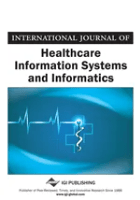
JMIR mHealth and uHealth
Scope & Guideline
Shaping Health Care with Cutting-Edge Research
Introduction
Aims and Scopes
- Mobile Health Interventions:
Research on the design, implementation, and efficacy of mobile health interventions aimed at improving various health outcomes, including chronic disease management, mental health support, and preventive care. - Wearable Technology:
Studies exploring the use and effectiveness of wearable devices in health monitoring, physical activity tracking, and chronic disease management, emphasizing data accuracy and user engagement. - Digital Behavioral Health:
Investigations into digital mental health interventions, including apps and platforms aimed at managing conditions like depression, anxiety, and substance use disorders. - Health Data Analytics:
Research focusing on the collection, analysis, and interpretation of health data generated from mobile health applications and wearables, including the use of machine learning and artificial intelligence. - Telehealth and Remote Monitoring:
Exploration of telehealth solutions and remote monitoring systems that facilitate patient care, particularly in chronic disease management and during public health emergencies. - Patient Engagement and User Experience:
Studies that assess user engagement, satisfaction, and the overall experience of individuals using mobile health applications, highlighting factors that influence adherence and usability. - Public Health and Policy:
Research addressing the implications of mobile health technologies on public health policy, including access to care, health equity, and regulatory considerations.
Trending and Emerging
- Artificial Intelligence and Machine Learning:
There is a growing trend towards leveraging AI and machine learning techniques in mobile health applications for predictive analytics, personalized interventions, and improving the accuracy of health monitoring. - Gamification in Health Apps:
Research on gamification strategies used in mobile health applications is on the rise, highlighting its effectiveness in enhancing user engagement and motivation for behavior change. - Integration of Social Media:
Emerging studies focus on the integration of social media platforms within mobile health interventions, exploring their potential to enhance community support and information dissemination. - Chronic Disease Management:
An increasing number of papers are dedicated to mobile health solutions for chronic disease management, particularly in conditions like diabetes, hypertension, and mental health disorders, emphasizing the importance of ongoing patient support. - User-Centered Design:
There is a clear trend towards utilizing user-centered design principles in the development of mobile health applications, ensuring that user needs and preferences are prioritized in the design process. - Data Privacy and Security:
With the rise of digital health tools, there is an emerging focus on the privacy and security of health data collected through mobile applications, reflecting growing concerns among users and regulators.
Declining or Waning
- Traditional Health Education Methods:
There has been a noticeable decrease in studies focusing solely on traditional health education methods without the integration of mobile technologies, as the field moves towards more interactive and engaging digital solutions. - Generic Health Apps:
Research on generic health applications that lack specific targeting or tailored interventions has diminished, as there is a growing emphasis on personalized and context-sensitive mobile health solutions. - Solely Text-Based Interventions:
The effectiveness of text-based interventions without multimedia or interactive components has seen a decline, as more comprehensive approaches utilizing video, gamification, and interactive elements gain traction. - Single Disease Focus:
Research that concentrates exclusively on interventions for single diseases without considering comorbidities or holistic approaches has decreased, reflecting a trend toward integrated health management strategies.
Similar Journals

International Journal of Healthcare Information Systems and Informatics
Fostering dialogue on critical healthcare informatics advancements.International Journal of Healthcare Information Systems and Informatics is a prestigious academic journal published by IGI Global, focusing on the vital intersection of healthcare and information technology. With an ISSN of 1555-3396 and E-ISSN of 1555-340X, this journal serves as a pivotal platform for researchers, professionals, and students to explore innovative solutions and advancements in healthcare informatics. As of 2023, it holds a commendable Q3 ranking in categories such as Information Systems and Medicine, highlighting its significant contribution to the academic community. Covering a wide range of topics from healthcare data management to the implementation of information systems in clinical settings, the journal aims to foster critical discussions and disseminate impactful research. With a publication history spanning from 2006 to 2024, it continues to play a crucial role in guiding the future of healthcare information systems. Readers can access this journal through traditional subscription methods, ensuring that leading-edge research reaches those most invested in the evolution of healthcare informatics.

JOURNAL OF TELEMEDICINE AND TELECARE
Shaping the future of healthcare through rigorous research.JOURNAL OF TELEMEDICINE AND TELECARE, published by SAGE PUBLICATIONS LTD, stands at the forefront of the rapidly evolving fields of health informatics and telemedicine. With its ISSN 1357-633X and E-ISSN 1758-1109, this prestigious journal has been a vital platform for innovation and research since its inception in 1995, covering a wide array of topics from remote patient monitoring to the integration of artificial intelligence in healthcare delivery. Recognized for its rigorous academic standards, the journal boasts an impressive impact factor, positioning it in the Q1 quartile for Health Informatics and securing a remarkable rank of #9 out of 138 in Scopus, placing it in the 93rd percentile among its peers. By disseminating high-quality research, the JOURNAL OF TELEMEDICINE AND TELECARE contributes significantly to the advancement of knowledge, shaping best practices in telehealth and enhancing patient care worldwide. As a non-open access journal, it appeals to a broad audience of researchers, healthcare professionals, and students, facilitating critical discourse on the future of healthcare technology. Stay at the forefront of this essential domain by engaging with the latest findings and projects featured in this influential publication.

JOURNAL OF MEDICAL INTERNET RESEARCH
Leading the Charge in Health Informatics ResearchJOURNAL OF MEDICAL INTERNET RESEARCH, published by JMIR PUBLICATIONS, INC, stands as a pivotal resource in the field of Health Informatics, with an esteemed ranking of #7 out of 138 in the Scopus database, placing it in the top 95th percentile. Since its inception in 1999, this Open Access journal has been committed to disseminating high-quality, peer-reviewed research that explores the intersection of healthcare and internet technologies. With its headquarters in Toronto, Canada, the journal encompasses a broad range of topics, including eHealth, telemedicine, and mobile health innovations. The impact factor and its Q1 quartile ranking highlight the journal's significant influence and prevalence in advancing the understanding of digital health landscapes. Researchers, professionals, and students alike benefit from its valuable insights, making the JOURNAL OF MEDICAL INTERNET RESEARCH an essential tool for fostering informed practices and policy-making in the rapidly evolving domain of health informatics.

BMJ Health & Care Informatics
Elevating Health Outcomes Through Data-Driven InsightsBMJ Health & Care Informatics, published by the esteemed BMJ Publishing Group, stands at the forefront of the rapidly evolving field of health informatics. Established as an Open Access journal in 2019, it is dedicated to disseminating high-quality research that enhances the integration of health care with information technologies. With a prominent Q1 ranking in 2023 across categories such as Computer Science Applications, Health Informatics, and Health Information Management, this journal serves as an essential resource for researchers and practitioners alike. The journal is indexed in reputable databases and boasts impressive Scopus ranks—notably, it is placed #43 among Health Informatics journals. The aim is to foster innovation and understanding in health care practices through rigorous research and collaboration. Encompassing a wide spectrum of topics within health data science, usability, and outcomes research, BMJ Health & Care Informatics is pivotal for anyone involved in advancing health care through technology.

Interactive Journal of Medical Research
Championing accessible knowledge for global health advancements.The Interactive Journal of Medical Research (ISSN: 1929-073X; E-ISSN: 1929-073X) is an esteemed publication by JMIR Publications, Inc., renowned for its commitment to advancing the field of medical research through innovative and accessible scholarship. As an Open Access journal since 2012, it provides researchers, clinicians, and students around the globe with the opportunity to access cutting-edge studies without any subscription barriers, thereby promoting the rapid dissemination of knowledge in the rapidly evolving landscape of health and medical informatics. The journal's scope encompasses a diverse range of topics, including health data analytics, digital health innovations, and user-centered design in medical software, making it an essential resource for those seeking to stay at the forefront of medical research. With a dedicated readership and a focus on real-world applications, this journal plays a pivotal role in fostering collaboration among professionals and nurturing the next generation of researchers in the medical field. For further details, visit JMIR Publications' website and explore the wealth of resources available.

Healthcare Technology Letters
Advancing healthcare through innovative technology insights.Healthcare Technology Letters is a leading open-access journal published by WILEY that has been at the forefront of disseminating cutting-edge research in the field of health informatics and health information management since its inception in 2014. With an E-ISSN of 2053-3713, this esteemed journal is recognized for its commitment to advancing knowledge and practice in healthcare technology, making it a vital resource for researchers, professionals, and students alike. The journal's scope encompasses a wide range of topics, including digital health solutions, data management, and innovative technologies that enhance patient care. It holds a respectable position in the academic community, featuring a Q3 ranking in both health informatics and health information management as of 2023, and consistently contributing to high-impact research evidenced by its Scopus rankings. By providing open access to its content since 2017, Healthcare Technology Letters ensures that valuable insights and breakthroughs can reach a broader audience, furthering the impact of its published work on the global health landscape.

Preventive Medicine Reports
Leading the charge in health informatics and preventive practices.Preventive Medicine Reports is a premier open-access journal published by Elsevier, dedicated to advancing the field of preventive medicine and public health. With a focus on innovative research and practices since its inception in 2014, this journal has established itself in the top quartile (Q1) of both Health Informatics and Public Health, Environmental and Occupational Health categories as of 2023. This positions it among the leading publications in its field, showcasing significant contributions to health informatics and public health strategies. The journal's accessibility allows researchers, professionals, and students worldwide to engage with cutting-edge studies that inform health policy and preventive initiatives. By fostering an open exchange of knowledge, Preventive Medicine Reports aims to reduce health disparities and improve population health outcomes, making it an essential resource for anyone invested in the future of health sciences.

mHealth
Empowering Health Through Digital ConnectivitymHealth is a pivotal peer-reviewed journal published by AME PUBLISHING COMPANY, focusing on the evolving field of mobile health technologies and their impact on public health and health informatics. With an E-ISSN of 2306-9740, this journal, based in China, operates under an open access model, ensuring widespread dissemination and accessibility of published research. As of 2023, mHealth is recognized in the Q2 category for both Health Informatics and Public Health, Environmental and Occupational Health, reflecting its significant contribution to vital areas of contemporary health research. The journal's Scopus rankings further enhance its reputation, situating it in the 74th percentile for Public Health and 64th for Health Informatics, making it an essential resource for researchers, professionals, and students eager to explore the intersection of technology and health outcomes. Covering a diverse range of topics from 2019 through 2024, mHealth aims to foster innovation and knowledge exchange among practitioners and scholars alike.

JAMIA Open
Innovative insights for a healthier tomorrow.JAMIA Open is an open-access journal dedicated to advancing the field of health informatics, published by Oxford University Press. Since its inception in 2018, the journal has provided a platform for novel research, reviews, and case studies that bridge the gap between healthcare and information technology. With an impressive impact factor and a current classification in the Q2 quartile for Health Informatics, JAMIA Open has established itself as a vital resource for researchers and practitioners alike, facilitating the dissemination of innovative findings that contribute to the evolution of healthcare systems. Based in the United States, the journal is committed to providing free and equitable access to high-quality research, thus promoting a collaborative and informed approach to tackling pressing health issues. As it continues to grow and evolve, JAMIA Open remains a cornerstone in the landscape of health informatics, appealing to a diverse audience of researchers, professionals, and students looking to inspire change in their fields.

Frontiers in Digital Health
Transforming Healthcare with Cutting-Edge TechnologyFrontiers in Digital Health is an innovative peer-reviewed journal published by FRONTIERS MEDIA SA, focusing on the intersection of digital technology and healthcare. As an Open Access journal since 2020, it aims to democratize knowledge by making cutting-edge research freely available to the global community. The journal covers a wide array of topics within the realms of Biomedical Engineering, Health Informatics, and a variety of Computer Science Applications, ensuring interdisciplinary collaboration and advancements. Recognized for its excellence, it holds prestigious rankings in multiple categories, including Q1 in Biomedical Engineering and Q2 in several related fields according to the 2023 metrics. Set in the heart of Switzerland, the journal fosters a comprehensive approach to enhancing digital health technologies, making it an essential resource for researchers, professionals, and students dedicated to improving health outcomes through innovation.